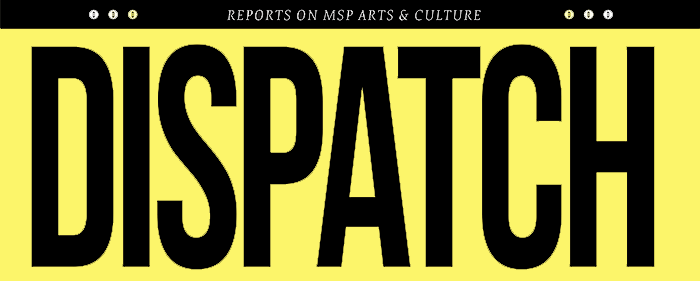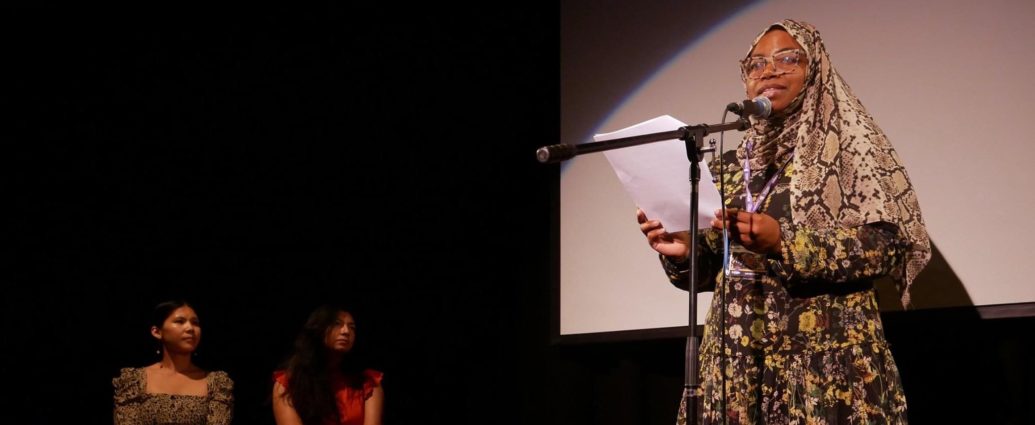With the massive Fringe Festival staging its final shows of the fest, we’ve heard amazing buzz around one show in particular—Changing the Narrative: Climate Stories for Justice, a performance that matches up personal stories about Climate Change from organizers who work in the space (don’t we all?) with music from the incredible duo Buffalo Weaver and illustration by Lisa Troutman. First-time producer Jothsna Harris of Changing Narrative LLC, an org that exists to build capacity in the climate justice movement through the power of stories, answered some of our questions ahead of the show’s final installment on Saturday, Aug. 13th (don’t wait until it sells out to get those tickets!).
DISPATCH: So many Fringe shows try to go for the gusto in the size, scope, and . But ‘Changing the Narrative’ has actually accomplished it. Is it because of the largess of the topic with Climate Change, the many talented folks involved or …?
Jothsna Harris: The intention of the show is not to blast people with climate change awareness and forced hope; instead, Changing the Narrative: Climate Stories for Justice is a humanizing and refreshing take on traditional climate change engagement, utilizing art as a point of entry into the topic through live spoken narratives interspersed with music, poetry, and illustration. The show honors the originally crafted personal narratives from three Twin Cities Climate Justice organizers, Whitney Terrill (Minnesota Interfaith Power and Light), Nicole Ektnitphong (Climate Advocacy Lab), and Leslee Gutiérrez Carrillo (COPAL), each representing perspectives and histories that often are not heard in mainstream communications on climate change. Each story is laden with facts about climate change that reinforce their experiences. Built on the premise of ‘pleasure activism’, we can experience joy while igniting agency in a severe crisis. The show helps audiences engage their hearts and heads on this critical issue of our time, which is essential for sparking action.
We often find that there’s a very strong kernel of motivation behind the best Fringe Shows, a sort of goal that the producer/artist wants to convey. What is it for you specifically and Changing the Narrative: Climate Stories for Justice? And how do you keep it from leading to a sort of climate nihilism!?
Most don’t think of storytelling when we think about climate change and what we and others can do to make a difference. Especially when the science has dominated the way we talk about it. But our personal stories balance the data and create relevance for what climate change means for our lives. The truth is climate change is all around us from heatwaves, wildfires, droughts, flooding, and hurricanes, it is now part of the human experience. Whether we realize it or not, we all have a climate story.
Changing the Narrative means that to shift dominant and damaging narratives, we must include the voices of everyday people and centering stories that are typically excluded from critical discussions and decision-making on climate change. Including Black, Indigenous, People of Color , people with lower incomes, LGBTQIA, people with disabilities, and others that experience a disproportionate burden of the impacts. Through powerful themes of environmental racism, climate migration, fossil fuel divestment, youth activism, eco-anxiety, generational trauma, labor rights, Indigenous and ancestral wisdom. The short 50-minute show demonstrates the intersectionality of climate change as a social justice issue calling for a just and equitable transition that we can all be part of shaping our shared future.
The show avoids climate nihilism in that storytellers and musicians lead by breaking into the truth of their own brokenness living in our damaged world – building an understanding that it is okay to hold a spectrum of emotions from loss, grief, anger, resolve, agency, and even joy—because we are human and we are still here. The show incorporates laughter and tears and builds a sense of community—all essential to prompt healing.
Three women from local organizations working for climate justice (Whitney Terrill of Minnesota Interfaith Power and Light, Nicole Ektnitphong of Climate Advocacy Lab, and Leslee Gutiérrez Carrillo of COPAL) tell their very personal stories about climate change. Why such a personal approach to the show, what does that bring to the live staging?
The demonstration of vulnerability invites the audiences to immerse themselves in the stories they hear and evoke their own memories and experiences. Rather than starting with facts, which often shut down conversations on climate change, our stories bend the ear differently to listen, and our lived experiences are difficult to dispute. The result is an opening of a conversation and an invitation for the audience to get involved by learning more about climate change, and engaging in solutions. Through the virtual show program, dozens of local and national organizations provide resources, campaigns, events, and other opportunities to get involved in the climate justice movement. In addition, there are tips for reflecting and writing your own climate story and how to use it as an advocacy tool—sharing as testimony with legislators, publishing as an op-ed, sharing at a live event, or in everyday conversations with family and friends.
Anyone who has heard/seen The Buffalo Weavers will be blown away. How did they get involved?
That is so true! The Buffalo Weavers are pure magic, guiding people through music and poetry that is gentle and fierce; they provide healing through their words and wishes. Change Narrative and the Buffalo Weavers are regular collaborators, bringing creative and empathetic ways to help prompt a path to healing in our broken world.
Changing the Narrative: Climate Stories for Justice is partly supported by Oyate Hotanin (Voice of the People) as part of a year-long climate action-driven project, Society of Mother Earth (S.O.M.E.). —in collaboration with Buffalo Weavers and Change Narrative, Developed with funding as an awardee of the Minnesota Humanities Center 2022-2023 Cultural Heritage and Community Identity Grant, Society of Mother Earth intends to foster relationships between humans and the environment through performances, gatherings, and storytelling initiatives. Music videos featuring guest artists and a documentary film will also be produced as a culmination of the experiences to expand the project’s reach.
For news and updates, please follow along on social media at @oyatehotanin @changenarrativellc @buffaloweavers and on Instagram. Changing the Narrative: Climate Stories for Justice was made possible by sponsors The Nature Conservancy and City and County Credit Union.


Comments are closed, but trackbacks and pingbacks are open.